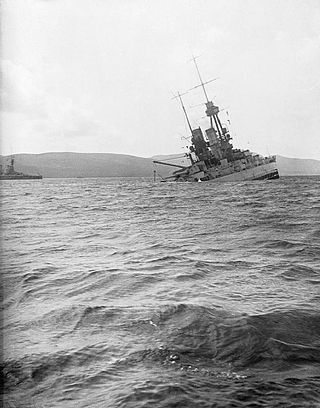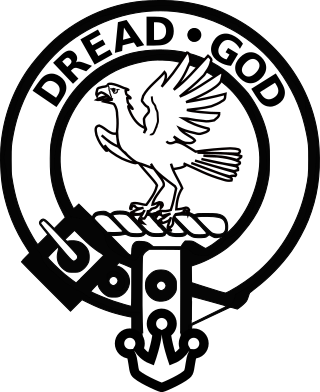Contents
| |||||
| Centuries: | |||||
|---|---|---|---|---|---|
| Decades: | |||||
| See also: | List of years in Scotland Timeline of Scottish history 1919 in: The UK • Wales • Elsewhere Scottish football: 1918–19 • 1919–20 | ||||
Events from the year 1919 in Scotland .
| |||||
| Centuries: | |||||
|---|---|---|---|---|---|
| Decades: | |||||
| See also: | List of years in Scotland Timeline of Scottish history 1919 in: The UK • Wales • Elsewhere Scottish football: 1918–19 • 1919–20 | ||||
Events from the year 1919 in Scotland .



Scapa Flow is a body of water in the Orkney Islands, Scotland, sheltered by the islands of Mainland, Graemsay, Burray, South Ronaldsay and Hoy. Its sheltered waters have played an important role in travel, trade and conflict throughout the centuries. Vikings anchored their longships in Scapa Flow more than a thousand years ago. It was the United Kingdom's chief naval base during the First and Second World wars, but the facility was closed in 1956.

The Grand Fleet was the main battlefleet of the Royal Navy during the First World War. It was established in August 1914 and disbanded in April 1919. Its main base was Scapa Flow in the Orkney Islands.

The Battle of George Square was a violent confrontation in Glasgow, Scotland between City of Glasgow Police and striking workers, centred around George Square. The "battle", also known as "Bloody Friday" or "Black Friday", took place on Friday 31 January 1919, shortly after the end of the First World War. During the riot, the Sheriff of Lanarkshire called for military aid, and government troops, supported by six tanks, were moved to key points in the city. The strike leaders were arrested for inciting the riot. Although it is often stated that there were no fatalities, one police constable died several months later from injuries received during the rioting.
Events from the year 1820 in the United Kingdom. This year sees a change of monarch after a nine-year Regency.
Events from the year 1919 in the United Kingdom.

On 21 June 1919, shortly after the end of the First World War, the Imperial German Navy's High Seas Fleet was scuttled by its sailors while held off the harbour of the British Royal Navy base at Scapa Flow, in the Orkney Islands of Scotland. The fleet was interned there under the terms of the Armistice of 11 November 1918 while negotiations took place over its fate. Fearing that either the British would seize the ships unilaterally or the German government at the time might reject the Treaty of Versailles and resume the war effort, Admiral Ludwig von Reuter decided to scuttle the fleet.

Clan Munro is a Highland Scottish clan. Historically the clan was based in Easter Ross in the Scottish Highlands. Traditional origins of the clan give its founder as Donald Munro who came from the north of Ireland and settled in Scotland in the eleventh century, though its true founder may have lived much later. It is also a strong tradition that the Munro chiefs supported Robert the Bruce during the Wars of Scottish Independence. The first proven clan chief on record however is Robert de Munro who died in 1369; his father is mentioned but not named in a number of charters. The clan chiefs originally held land principally at Findon on the Black Isle but exchanged it in 1350 for Estirfowlys. Robert's son Hugh who died in 1425 was the first of the family to be styled "of Foulis", despite which clan genealogies describe him as 9th baron.
Events from the year 1945 in Scotland.
Events from the year 1927 in Scotland.
Events from the year 1925 in Scotland.
Events from the year 1920 in Scotland.
Events from the year 1918 in Scotland.
Events from the year 1917 in Scotland.
Events from the year 1916 in Scotland.
Events from the year 1915 in Scotland.
Events from the year 1914 in Scotland.
Events from the year 1904 in Scotland.
Events from the year 1882 in Scotland.
Events from the year 1838 in Scotland.
Events from the year 1826 in Scotland.
{{cite web}}: CS1 maint: unfit URL (link)